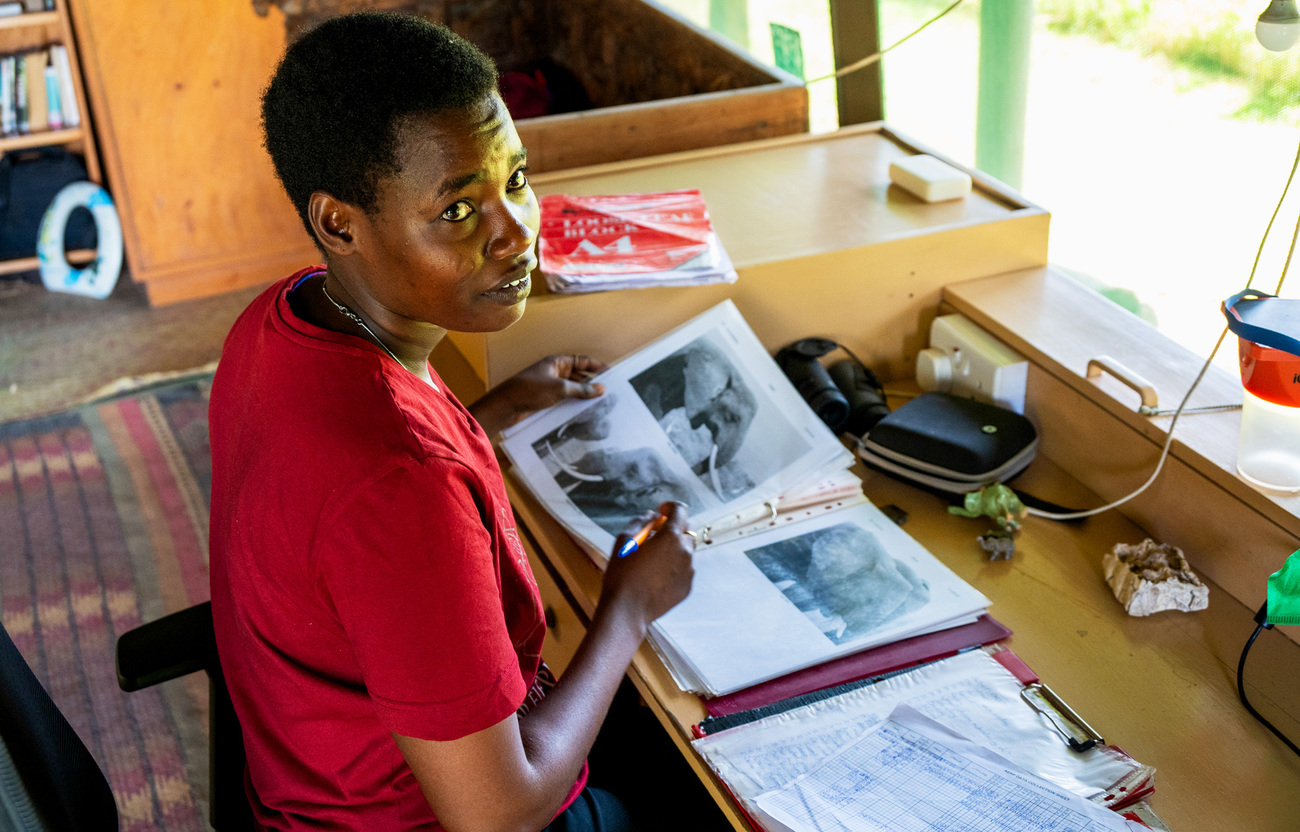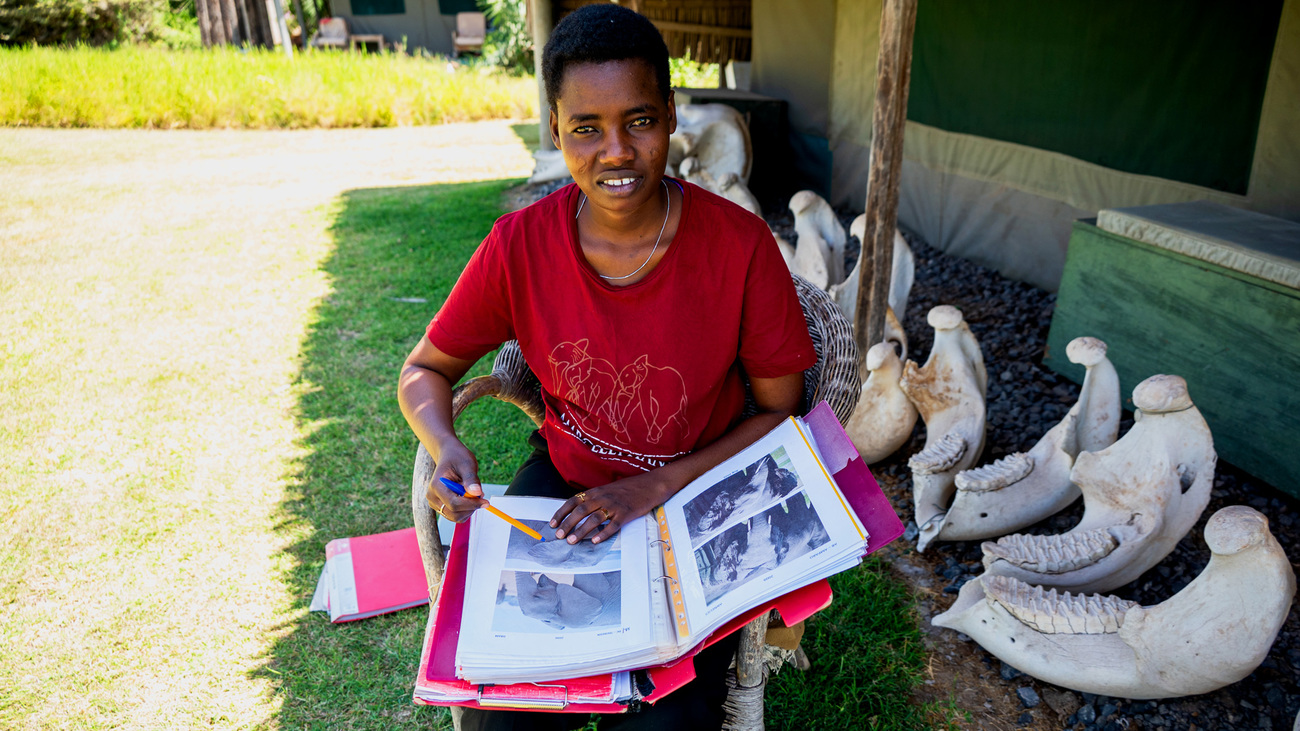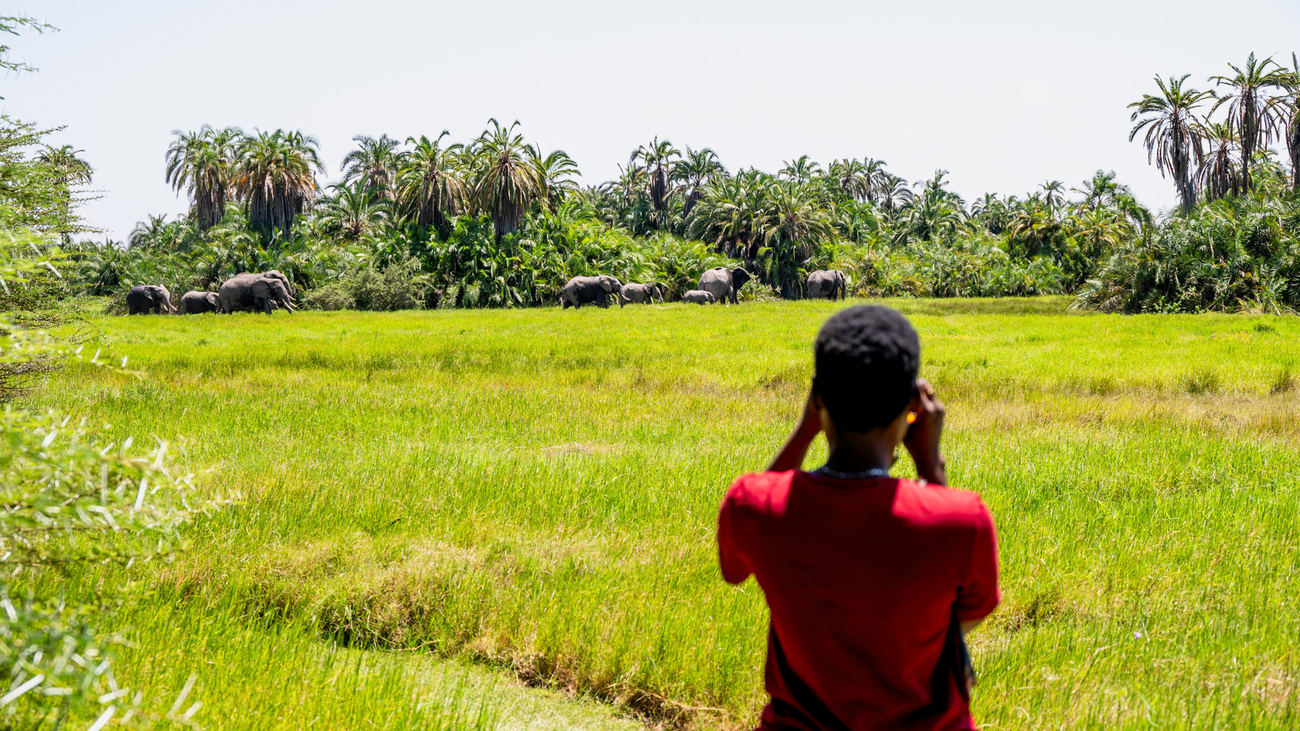Press releases
40 years after the whaling ban – whales continue to die
Read moreIFAW scholarships fuel dreams of young students and support conservation
As the sun approaches its scorching zenith in Amboseli National Park, 25-year-old Cecilia Parsae stands tall in a vintage Land Rover defender, squinting as she scans the African savannah through a pair of binoculars. ‘Yes! That is Edwina, the matriarch of the EB3 family,’ she proclaims in excitement.
As the field research officer for the Amboseli Trust for Elephants, Cecilia offers fresh hope and inspiration to save the world’s largest land mammal from extinction by closely monitoring the behaviour, distribution, threats, habitat use, and movement of all 64 elephant families that call Amboseli home.
She quietly follows and observes herds of elephants roaming the park, collecting data on sightings, recording everything from a small tear on an elephant’s floppy ears to a chipped tusk. Identifying elephants is all about these little details. ‘Elephants have the biggest brains of all terrestrial animals, so they are extremely intelligent and have great memories,’ Cecilia explains. ‘That is why they say an elephant never forgets.’
While her day job might seem idyllic for many, Cecilia’s journey was not easy. Her story of resilience in the face of adversity and daunting challenges to access education inspires hope for young girls in her community.

Growing up in the Maasai community of Kajiado County, Cecilia experienced firsthand the struggles faced by young girls. At 15, she became pregnant, forcing her to drop out of school. Her childhood cut short, she faced a life of unprepared motherhood.
After a year out of school to take care of her baby, she returned to class to continue with her primary education, thanks to the help of her brother and her headteacher. Despite the social stigma associated with early pregnancies, Cecilia defied all odds to complete her primary school education as a young mother, delicately balancing her time between her studies and her young child.
Two years later, her plans to enroll in high school hit a wall when she faced familiar financial hurdles. With limited economic livelihood opportunities available, the amount of money required to pay school fees is out of reach for most rural families in Kajiado County. Additionally, in the culture in which Cecilia grew up, teenage girls are often seen as a source of wealth through their bride price, further limiting their access to education. Cecilia’s parents were ready to marry her off to a young suitor to provide some much-needed financial relief and ease their economic burdens—an arrangement she vehemently refused.
Luckily, she was fortunate to have had the local area chief, George Lupembe, firmly on her side. A staunch believer in the power of education, George advocated for Cecilia’s right to continue her education. Through the Wings to Fly scholarship programme, she managed to successfully pursue and complete high school.
She then set her eyes on university, and while she continued to face significant financial barriers, her academic achievement attracted a new opportunity—IFAW's scholarship programme. Thanks to IFAW’s support, Cecilia was able to attend Egerton University. She recently graduated with a veterinary medicine degree.

Cecilia’s story mirrors the harsh reality facing many other young learners in the developing world. In developed economies, basic education is a fundamental human need that is almost fully guaranteed. In sub-Saharan Africa, quality education remains an unattainable dream for more than 98 million children who remain out of school.
This puts an entire generation’s future in jeopardy. Education is an equaliser—it opens doors to a lifetime of opportunities and reduces social and economic inequalities. While significant strides have been made to improve access to education globally, disparities continue to drive a wedge between those who can become educated and those who cannot, deepening the systemic inequality that education is designed to dismantle in the first place.
In remote corners of rural East Africa, where poverty and economic inequality create overwhelming barriers to education, the picture remains bleak. According to UNESCO, in 2024, more than half of the world's out-of-school children and youth (a total of about 251 million) lived in sub-Saharan Africa. Despite significant investments in the education sector, funding gaps persist across the continent.
In the financial year 2023/2024, the Government of Kenya spent US$4.76 billion on education, representing 27.4% of the national budget—the largest allocation of the budget to any sector. However, despite having the lion’s share of resources, Kenya’s education sector keeps staring at recurrent funding gaps with persistent budget shortfalls, threatening key programmes in schools and universities nationwide. This deficit has been increasing year by year. In 2025, the funding gap stands at a staggering US$335 million.
The impact of this shortfall is huge; it threatens to cut short the dreams of many students like Cecilia. It hinders the training of teachers, who play a crucial role in transforming the educational experience; it undermines school feeding initiatives, the improvement of facilities in learning institutions, and other education outcomes such as student admission, retention, and enrolment.
Inevitably, families are forced to endure the burden of higher out-of-pocket expenses. This causes students to drop out and limits future career opportunities, keeping many locked in the cycle of poverty.
IFAW’s scholarship programme provides a glimmer of hope for deserving students from economically impoverished backgrounds within Kajiado County—home to IFAW’s anchor Room to Roam landscape. IFAW’s ambitious vision for conservation across East and southern Africa, Room to Roam aims to connect and secure landscapes for elephants and other wildlife, helping animals and people coexist and thrive.
The scholarship programme was introduced to tackle inequality by supporting secondary education, diploma, and degree courses for top-performing students from financially disadvantaged backgrounds. Over the past decade, IFAW has provided full scholarships for 120 students, covering tuition fees, rent, transport, food, and upkeep costs. With this comprehensive support, these educational opportunities provide a lifeline for learners to dream big, enabling students to fully focus on what matters most—learning the skills that set them up for a sustainable future and disrupt the cycle of poverty.

In addition to reducing overreliance on natural resources, scholarships empower individuals and communities with knowledge and skills necessary to effectively manage these resources, tackle environmental challenges, and adopt sustainable livelihood practices. Additionally, it's a pathway to promoting local ownership of wildlife resources within landscapes where IFAW works.
As a young professional working to protect elephants, Cecilia inspires many young girls from her community. Her story demonstrates that through education, we can champion sustainable livelihoods and protect wildlife like elephants.
Every problem has a solution, every solution needs support.
The problems we face are urgent, complicated, and resistant to change. Real solutions demand creativity, hard work and involvement from people like you.
Unfortunately, the browser you use is outdated and does not allow you to display the site correctly. Please install any of the modern browsers, for example:
Google Chrome Firefox Safari